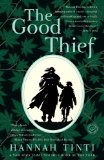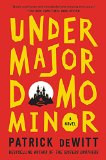Summary | Excerpt | Reading Guide | Reviews | Beyond the book | Read-Alikes | Genres & Themes | Author Bio

A Novel
by Hannah TintiRichly imagined, gothically spooky, and replete with the ingenious storytelling ability of a born novelist, The Good Thief introduces one of the most appealing young heroes in contemporary fiction and ratifies Hannah Tinti as one of our most exciting new talents.
Twelve year-old Ren is missing his left hand. How it was lost is a mystery that Ren has been trying to solve for his entire life, as well as who his parents are, and why he was abandoned as an infant at Saint Anthony’s Orphanage for boys. He longs for a family to call his own and is terrified of the day he will be sent alone into the world.
But then a young man named Benjamin Nab appears, claiming to be Ren’s long-lost brother, and his convincing tale of how Ren lost his hand and his parents persuades the monks at the orphanage to release the boy and to give Ren some hope. But is Benjamin really who he says he is? Journeying through a New England of whaling towns and meadowed farmlands, Ren is introduced to a vibrant world of hardscrabble adventure filled with outrageous scam artists, grave robbers, and petty thieves. If he stays, Ren becomes one of them. If he goes, he’s lost once again. As Ren begins to find clues to his hidden parentage he comes to suspect that Benjamin not only holds the key to his future, but to his past as well.
Scarcely thirty pages in, I realized what I suspected was true: this is the book that everyone will love this summer. Not just you, but your teenage daughter, your 12-year-old grandson, your mother or grandmother... it's hard to think of someone that won't be taken with this lovely little book. An adventure tale with a good dose of Gothic finery, The Good Thief is refreshingly old-fashioned, wonderfully strange, and darkly funny. It's suspenseful and grim, but you can still read it before bed, and its charm is quirky enough to keep it from ever becoming twee .... Unfortunately, the second half of The Good Thief doesn't quite measure up to the great promise of the first. As the plot progresses it wavers dangerously between delightful quirkiness and hokum .... All in all, The Good Thief probably won't change your life, but it will remind you of the up-all-night-with-a-flashlight novels of your childhood that, in some way, did...continued
Full Review
(585 words)
This review is available to non-members for a limited time. For full access,
become a member today.
(Reviewed by Lucia Silva).
When we think of grave-robbing, we usually think of dark tales involving
bandits pillaging graves for jewelry or other valuables. But the value of bodies
in the 19th century stretched far beyond that of their adornments.
Before people began donating their bodies to science, the only legal supply of
cadavers in the UK for medical research and education were those of convicted
murderers sentenced to death and dissection.
As medical science began to flourish in the 19th century, criminals
and doctors became strange bedfellows as dead bodies were bought and sold in a
morally complex quest for medical advancement. At the time, stealing a
corpse was only a misdemeanor, not a felony, and body-snatchers or resurrection
men, as ...
This "beyond the book" feature is available to non-members for a limited time. Join today for full access.

If you liked The Good Thief, try these:

by Patrick deWitt
Published 2016
A love story, an adventure story, a fable without a moral, and an ink-black comedy of manners, Undermajordomo Minor is Patrick deWitt's long-awaited follow-up to the internationally bestselling and critically acclaimed novel The Sisters Brothers.

by Anna Lawrence Pietroni
Published 2011
A story that feels mythical or folkloric, that is driven by a mystery, throbs with tension, and ends in conflagration. Ruby’s Spoon combines a gritty, hypervivid realism with the dreamlike richness of a fable.
Heaven has no rage like love to hatred turned, Nor hell a fury like a woman scorned.
Click Here to find out who said this, as well as discovering other famous literary quotes!